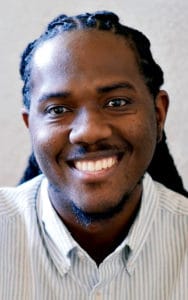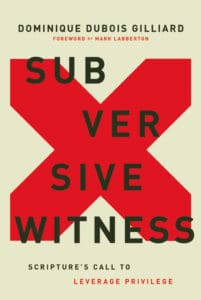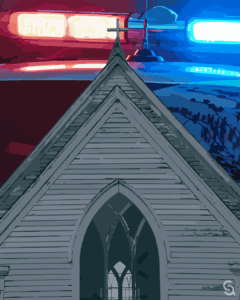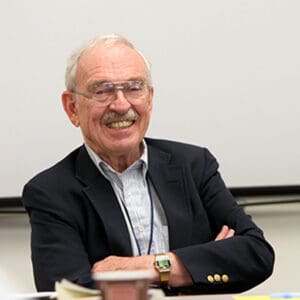 We recently talked with Dominique Gilliard, author of the forthcoming Subversive Witness: Scripture’s Call to Leverage Privilege, published by Zondervan Academic and being released August 24, 2021. Here, he talks about why he wrote the book and how we demonstrate a subversive witness that reflects the call and model of Jesus Christ.
We recently talked with Dominique Gilliard, author of the forthcoming Subversive Witness: Scripture’s Call to Leverage Privilege, published by Zondervan Academic and being released August 24, 2021. Here, he talks about why he wrote the book and how we demonstrate a subversive witness that reflects the call and model of Jesus Christ.
Why the term “subversive witness”? What have we been doing wrong all of these years?
Rather than merely affirming the status quo, the church should be a transformative presence in the world. We’re commissioned to be repairers of the breach, ambassadors of reconciliation, and co-laborers with Christ who help usher in the kingdom on earth as it is in heaven.
“Subversive” means undermining the power and authority of an established order. Worldly empires prioritize ethics and principles that oppose God’s will, and Scripture tells us to resist conforming to this pattern—to be subversive. We demonstrate who and whose we are by how we live, love, and steward our possessions. Subversive witnesses proclaim, demonstrate, and participate in the inaugurated reign of God.
Cardinal Paulo Evaristo Arns was told that the poor must serve as sacrificial offerings for systemic thriving. He declared that such systems must be subverted. Arns wrote that the word “subversive” “means to turn a situation around and look at it from the other side.” We’ve failed to subvert sinful systems and look at oppression from the other side. We doubt that the truth will authentically set us free. We haven’t functioned as an interconnected body. We don’t consistently love mercy, do justice, or walk humbly with God. Consequently, we’ve failed “to produce fruit in keeping with repentance.”
Where did the idea for this book come from? When did you know you needed to write a book on privilege?
My MDiv thesis argued that most Western Christians read Scripture through a privileged lens. That we, too often, are taught to exclusively read ourselves as Scripture’s protagonist. This flawed reading of Scripture squelches the Spirit and domesticates Christian ethics. While I still believe this, I also realize that the problem of privilege is much more expansive.
Scripture affirms that privilege is real and declares that while we have the option to exploit privilege for selfish gain or passively benefit from it, we are called to acknowledge and faithfully steward it. Missionally, we should leverage privilege to further the kingdom and sacrificially love our neighbor.
However, congregational conversations about privilege generally end in one of three places: churches and members deny that privilege exists, they consider the topic too controversial to address, or they lament, feeling immobilized by its weight.
None of these responses animate our faith and empower us to bear a faithful witness. Subversive Witness soberly addresses privilege by showing how it can hinder us from perceiving and responding to God’s call on our lives. But it also demonstrates how privilege can be generative and liberating, compelling us to participate in the inbreaking reign of God in innovative and surprising ways.
You say that we need to “address privilege in our midst.” What does that look like practically played out?
It looks like developing eyes to soberly see our communities, ears to compassionately hear the anguished cries of our oppressed neighbors, and hearts that respond whenever sin (individual or systemic) causes theft, death, and destruction. It entails understanding that those who thrive off systems and structures that subjugate, dehumanize, and oppress the least of these usually don’t perceive the gospel as good news.
In fact, the gospel threatens what they define as safety, security, and abundant life. Therefore, we must discern how the empire strategically distributes trinkets to subdue our ethics and convictions, ultimately making us complicit with sin and apathetic towards injustice.
It means having the integrity to resist self-centered logics that embolden us to pass by on the other side as our wounded neighbors hemorrhage and die. It means refusing to misuse religion and spiritual obligations as excuses to avoid inconveniencing our lives and pursuing justice and shalom.
It means not only loving the poor, but also asking why the poor are poor and why entire communities are disenfranchised. It means telling the truth about wealth inequality—how it was forged and what sustains it—and then, as Dr. King said, seeking “to tear down unjust conditions and build anew instead of patching things up.”
What does prioritizing the Great Commission and the Great Commandment look like for followers of Christ today?
It looks like taking both dimensions of the cross seriously and refusing to embrace one at the expense of the other. It looks like denouncing proclamations of the gospel that pit evangelism against justice, because both are required. Dr. King said, “Any religion that professes to be concerned about the souls of men and is not concerned about the slums that damn them, the economic conditions that strangle them and the social conditions that cripple them is a spiritually moribund religion awaiting burial.”
John 13:35 explains, “By this everyone will know that you are my disciples, if you love one another.” However, rather than being known by our love, too often we’re known by what we oppose. We don’t demonstrate that we’re Christ’s disciples by falsifying history, silencing suffering, or waging culture wars.
The world won’t know that we’re Christ’s disciples when we “stay above the fray” as our neighbors’ blood flows throughout the streets and as sinful systems, structures, and laws abound. We demonstrate Jesus is Lord by taking on the mindset of Christ, choosing cruciform solidarity, and refusing to dress our neighbors’ wounds as if they are not serious—proclaiming “peace, peace” when there is no peace. It requires holistically caring for people, not just souls.
_______
Book Excerpt
 Unchecked, privilege fosters mythology, emboldening an ahistorical theology and worldview. It allows whitewashed history to be canonized and institutionalized, immoral men to be venerated and revered, and nations to live in denial and unrepentant sin. Bryan Stevenson, the executive director of the Equal Justice Initiative, explains how this has played out in the US.
Unchecked, privilege fosters mythology, emboldening an ahistorical theology and worldview. It allows whitewashed history to be canonized and institutionalized, immoral men to be venerated and revered, and nations to live in denial and unrepentant sin. Bryan Stevenson, the executive director of the Equal Justice Initiative, explains how this has played out in the US.
In Rwanda, no one who comes there is allowed to spend time there without hearing about the genocide. In Germany, there is a commitment to remind people about the pain and suffering of the Holocaust. In the United States, it is the opposite. Not only are we not committed to telling [the] truth about slavery, lynching, and segregation, we have actually erected an iconography about a false story: how grand and glorious the 19th century was; how honorable the architects and defenders of slavery were; how fantastic it was to live in the first half of the 20th century; and how noble these elected leaders were while preaching segregation forever, or war.(1)
Unbridled privilege emboldens immaturity, trivializes oppression, and derails our pursuit of shalom. When we are not honest about what divides us, reconciliation becomes a facade for sustaining the status quo, and the body of Christ becomes a place where “Peace, peace,” is proclaimed when there is no peace.
Stevenson expounds on the relationship between truth and reconciliation.
I think we all want reconciliation. We want peace, we want understanding, we want redemption—all of these wonderful things. But we haven’t committed ourselves to truth-telling. Truth and reconciliation are not simultaneous. They are sequential. Tell the truth first, and it’s the truth that motivates you to understand what it will take to recover, repair, endure—to reconcile.(2)
The body of Christ is called to be a signpost of God’s love, mercy, and justice in the world. We cannot fulfill this calling if we continue to live in denial and unrepentant sin. We need truth to live into our created purpose and to move forward together.
Jesus said in John 8:32, “The truth will set you free.” Truth empowers the church to establish a common memory and helps us realize how we have conformed to the patterns of this world. Georges Erasmus, a First Nations leader from Canada, explained why establishing a common memory is so important. He said, “Where common memory is lacking, where people do not share in the same past, there can be no real community. Where community is to be formed, common memory must be created.”(3) As a covenant people, memory roots us in God’s promises, prompts us to remember God’s sovereignty, and reminds us of our identity in Christ. We were created for a purpose: to worship God, making our Creator’s name known and love shown throughout the world; fulfilling the Great Commission and the Greatest Commandment.
Legislative, Economic, and Educational Privilege
Privilege comes in many forms, and not every manifestation holds the same social currency. In the United States, race, gender, citizenship, class, education, sexual orientation, and able-bodiedness have been the chief expressions of privilege, with race, gender, citizenship, and class historically holding the most weight. Privilege is also stackable, meaning a person can possess multiple privileges at once. For example, initially only free, landowning, white men could be US citizens. Individuals who possessed five privileges—status (freedom), class, race, gender, and citizenship—were politically valued and socioeconomically subsidized over and against all others. That means that from its inception the US gave wealthy white men access to property, power, resources, and wealth that all other people were denied for nearly 144 years.
Moreover, after this period of exclusive access, white people were democratically endowed with unique access to important resources until at least 1965. This unique access has endowed most white children with the privilege of growing up in secure neighborhoods with premium amenities, matriculating in superior schools, and having access to more lucrative vocational opportunities. It has also included a criminal justice system that has legislated with a white bias. The vestiges of this history of systemic injustice linger and continue to undermine our proclamation of “liberty and justice for all.”
For example, school funding in the US derives from three sources. While the percentages vary from state to state, generally 45 percent of a local school’s funding comes from local property taxes, 45 percent comes from state funding, and 10 percent comes from federal funding.(4) Property values vary immensely from neighborhood to neighborhood and district to district. With that variance come vacillating tax revenues. These economic disparities create inequalities regarding access to quality education nationwide. Consequently, since the early 1970s, nearly every state has seen at least one lawsuit concerning school funding and equity.
A recent study examined the 13,000 traditional public school districts in the US and found about 7,600 where more than 75 percent of students were white and about1,200 where more than 75 percent of students were nonwhite. While the nonwhite school districts were much larger (usually located in large cities) than the white districts, the two groups had nearly the same number of students: 12.8 million children in nonwhite districts and 12.5 million in white districts.(5)
However, in 2016 nonwhite districts received nearly $54 billion in local tax dollars—or about $4,500 per student—while white school districts, which had higher incomes and lower poverty rates, collected more than $77 billion—or just over $7,000 per student.(6) On average, states added another $6,900 per student to white districts and almost $7,200 per student in nonwhite districts. The comprehensive gap in state and local funding was $23 billion. White districts, on average, had more than $2,000 more in funding per student than nonwhite districts.(7)
The report found the following:
Despite more than a half-century of integration efforts, the majority of America’s school children still attend racially concentrated school systems. This is reflective of the long history of segregation—policies related to everything from voting to housing—that have drawn lines and divided our communities.
Race and class are inextricably linked in the U.S. When comparing the poverty level of racially concentrated systems, a clear divide emerges. Predominantly white districts are far better off than their heavily nonwhite peers. These statistics confirm what we know about income inequality and the effects of segregation.
In the United States, 20% of students are enrolled in districts that are both poor and nonwhite,(8) but just 5% of students live in white districts that are equally financially challenged.(9)
This is only one example of how white students have continued to enjoy unique access post–1965. This unique access continues to order society.
How Privilege Shapes Society
We will never learn to leverage privilege to further the kingdom and love our neighbors if we continue to deny the existence of privilege. Acknowledging privilege is not about condemnation, shaming, or guilting one another into coerced actions. Christians are called to acknowledge privilege because it is real and because doing so liberates us from its power. Confronting and addressing privilege liberates us to live into our created purposefully and freely.
Acknowledging privilege should not be contentious. Privilege exists because of our unwillingness to deal soberly with structural sin and the legacy of inequity it has bred. Fundamentally, privilege is the by-product of our ancestors’ sins and the rotten fruit of the church’s indifference to systemic oppression and complicity with evil. Privilege is rarely neutral or benign; it almost always comes at the expense of our neighbors.
From chapter 1 of Subversive Witness: Scripture’s Call to Leverage Privilege by Dominique Gilliard, © 2021. Used by permission of Zondervan.
Dominique DuBois Gilliard is the Director of Racial Righteousness and Reconciliation for the Evangelical Covenant Church. He is the author of Rethinking Incarceration: Advocating for Justice that Restores, which won a 2018 Book of the Year Award for InterVarsity Press and was named Outreach Magazine’s 2019 Social Issues Resource of the Year. Gilliard also serves as an adjunct professor at North Park Theological Seminary and serves on the board of directors for the Christian Community Development Association. In 2015, the Huffington Post named him one of the “Black Christian Leaders Changing the World.” Subversive Witness is Gilliard’s latest book.
Endnotes:
1. Truth-Telling Before Reconciliation: A Conversation with Bryan Stevenson.
2. Ibid.
3. Quoted in Marlene Brant Castellano, Linda Archibald, and Mike DeGagné, From Truth to Reconciliation: Transforming the Legacy of Residential Schools.
4. Cory Turner, “Why America’s Schools Have A Money Problem.”
5. Non-white school districts included many large cities and were much larger than the white districts. White school district included many small rural areas. “Nonwhite school districts get $23 billion less than white districts despite serving the same number of students.”
6. Laura Meckler, “Report finds $23 billion racial funding gap for schools.”
7. Ibid.
8. 27% of students are enrolled in predominantly nonwhite districts; 26% of students are enrolled in predominantly white districts.


